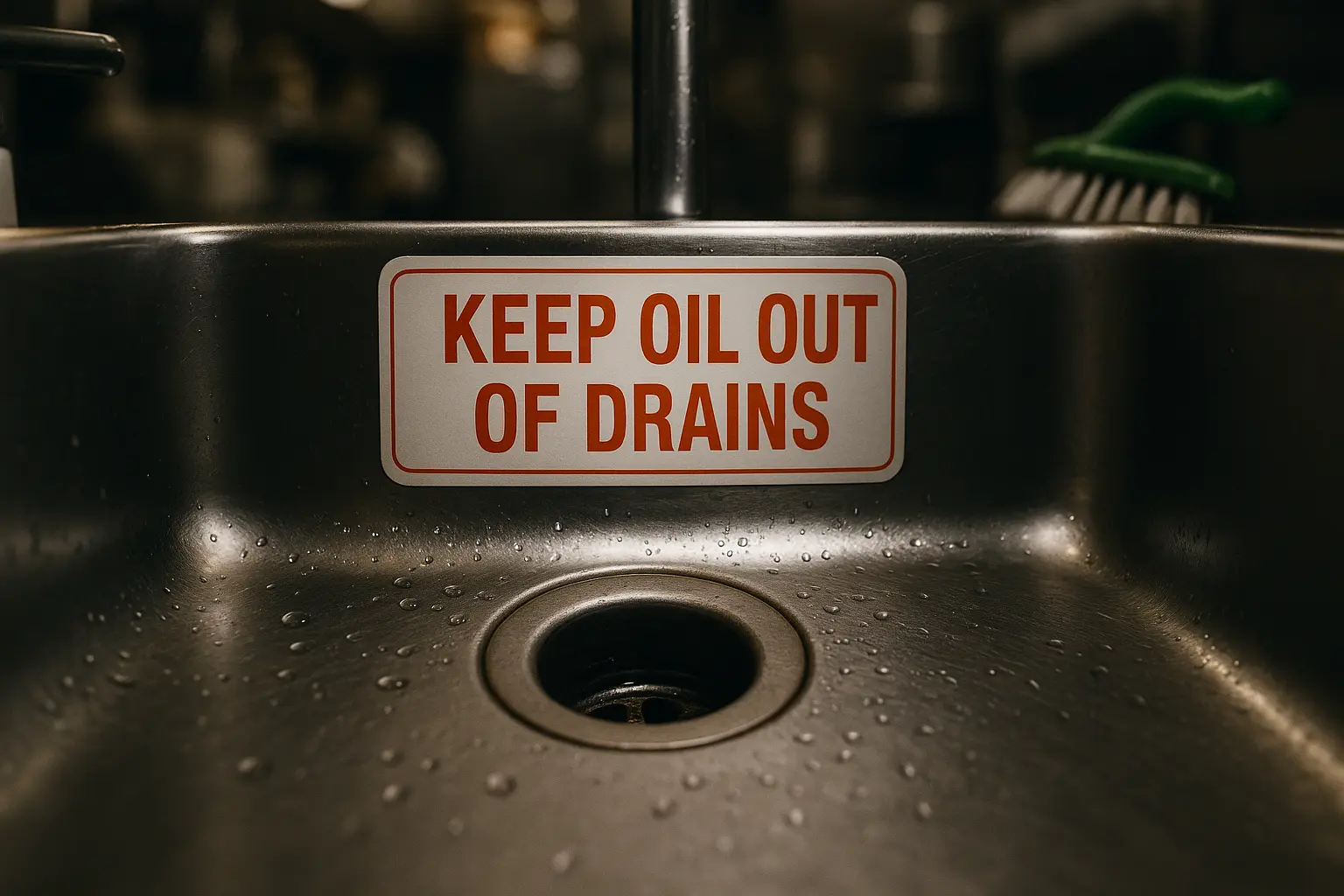Table of Contents
The high cost of pouring oil down the drain in NJ
Every cup of fryer oil that slips into a sink can congeal into “fatbergs” large enough to block municipal sewers. Livingston Township warns that backups send raw sewage into streets and basements and leave homeowners with four figure plumbing bills. The state also fines food businesses when grease discharges push FOG (fats, oils, grease) above 70 mg/L at the outflow of a trap. In short, careless disposal costs money, harms water quality, and risks regulatory action, so New Jersey puts clear rules in place.
What New Jersey law expects from you
New Jersey treats used cooking oil as a “Class D recyclable.” Any company that transports it for others must hold an A‑901 solid waste transporter license and display a NJDEP decal on every truck. Restaurants must keep working grease traps, record clean outs, and ensure effluent stays under the 70 mg/L FOG limit. Households have fewer formal rules but still may not pour oil into drains or storm sewers; local health departments can issue nuisance citations for repeated violations. Together these measures keep waterways cleaner and treatment plants functional.
The right way to handle small batches at home
For a sauté pan’s worth of oil, let the liquid cool, scrape food bits, then funnel it into a screw‑top jar or coffee can. ACUA, which serves Atlantic County, advises residents to double‑bag that sealed container and place it with regular trash; never in the sink. When your recipe leaves a quart or more, chill it overnight so it solidifies, then toss or bring it to a county drop‑off (see next section). Either approach prevents spills in the trash cart and keeps township pipes clear.
Recycling options: county drop‑off and biodiesel hubs
Several counties now recycle household cooking oil into biodiesel. Ocean County accepts up to 5 gal per household each day at both Lakewood and Manahawkin recycling centers from 7:30 a.m. to 3 p.m., Monday‑Saturday. Monmouth County’s HHW facility in Tinton Falls takes up to 20 gal of liquids per visit (containers ≤ 5 gal). Middlesex, Gloucester, and Union run similar programs; check your county recycling office for hours. A simple state map showing these depots with driving directions works well as a hero image for this section.
Professional kitchens: compliance, grease traps, and hauler rules
A restaurant fryer can generate 800 lb of waste oil in a month; far beyond household volumes. New Jersey requires every commercial kitchen to install, pump, and document grease‑interceptor clean‑outs. Haulers must file quarterly manifests and carry the A‑901 license noted earlier. When inspectors see records missing or oil overflow around a dumpster, they can suspend your food service certificate on the spot. Keeping a signed manifest folder by the back door; and scheduling regular pickups; protects uptime and reputation.
Safe storage: choosing the container that matches your volume
Cool oil should move from the fryer into a lidded container that won’t crack in winter or buckle in summer. Home cooks can repurpose 1 qt mason jars kept under the sink. Small cafés favor 55 gal drums with locking rings; boardwalk kiosks use 70 gal rolling caddies that fit through narrow alleys. High‑volume sites use 140gal and 300 gal sealed tanks with wand‑style pumps, preventing theft and spills. An overhead photo comparing these container sizes beside a 12 in pizza for scale makes a clear visual reference.
Choosing a licensed recycler what reliable service looks like
A good hauler installs the right container within 48 hours, sends digital pickup receipts, and adjusts rebates as cooking‑oil prices rise. Verify that the company:
- 1) lists its NJDEP A‑901 number on invoices,
- 2) provides spill‑response contacts, and
- 3) shows end‑use certifications (biodiesel, livestock feed, or soap manufacturing).
Services such as Grease Connections in Monmouth County advertise rebates starting at $0.30/gal for oil above 95 % purity. That payment can offset filter costs and even cover a quarterly trap pump‑out for busy restaurants.
FAQ and next steps
- Does flavored or shortening‑based oil recycle the same way? Yes, but keep lard and coconut oil separate so it solidifies and pumps easily.
- Can I mix motor oil? Never; motor oil is a hazardous material and ruins biodiesel feedstock.
- What if my town lacks a drop off? Chill and trash small amounts, or bring up to 5 gal to the nearest county listed above.
Ready for stress‑free pickups? Request a free site assessment, and we’ll size a container, set a pickup schedule, and handle your A 901 paperwork.









